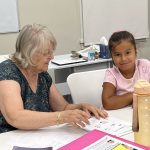Excessive screen time has been proven to interfere with cognitive ability and brain development. It has also been linked to increased levels of anxiety and negative affects on social skills and attention span. Screens should particularly be turned off when it gets closer to bedtime, as too much exposure to blue light from screens has been known to disrupt sleep patterns. We encourage that you give your child a very limited amount of screen time in general but especially during school nights. Help your child monitor their screen time and inspire them to engage in more time spent on hobbies, outside events, and creative activities. It’s very important that they’re able to function well at school and don’t always need to rely on screens to entertain them.
Parenting
Making Cursive Fun
Printing out worksheets with dotted cursive letters or words for your child to trace over is a perfect way to start practicing. This helps them get used to the flow and formation of cursive letters. You can provide themed writing prompts like favorite places or animals and have your child write about them in cursive. Encouraging creative writing while practicing cursive handwriting can make it a lot more fun. Another great way to make cursive more fun is using it in artwork like painting. Once your child gets used to the flow of the letters, they’ll be able to smoothly write cursive in no time.
Fun Activities Involving Math
- Involve your child in cooking or baking activities that require measuring ingredients. This is a great way for him to practice using math skills while also learning how to make new foods. Have him help you measure and mix ingredients using measuring cups and spoons. This hands-on experience is great for concepts like fractions and units of measurement in a practical context.
- Math Board Games: Play board games that incorporate math concepts, such as Monopoly, Snakes and Ladders, or Math Bingo. These games make learning fun and reinforce many different math subjects depending on which one you choose.
- Math Art Projects: Combine math and art by creating geometric shapes or patterns. Use materials like rulers and compasses to design and construct geometric artworks. Practicing geometry while creating art is a great way to do it.
Is Your Child Having Trouble With Reading?
Allow your child to choose books that interest him. If he has trouble reading alone, set aside time each day to read along together and always have a dictionary on hand. Make sure that the books are at your child’s reading level and provide access to many different subjects. Setting up a good reading environment will help your child want to focus more on reading and maybe even want to write stories of his own.
If your child needs help with reading skills, contact us at 727-441-4444.
Teach Your Child How to Use a Dictionary
1. Introduce the dictionary: Start by explaining what a dictionary is and its purpose. Show your child a physical dictionary. Explain that dictionaries contain words, their meanings, pronunciations, and sometimes additional information like word origins.
2. Help your child understand that words in a dictionary are arranged alphabetically. Practice with simple word lists or alphabet cards. Emphasize the importance of knowing the order of letters in the alphabet to locate words in the dictionary. Show your child how using the guide words at the top of the page can help speed up finding your word.
3. Practice pronunciation: Teach your child how to read pronunciation symbols in the dictionary. Practice pronouncing words together, paying attention to vowel sounds.
4. Encourage your child to look up words they encounter while reading or during conversations. Provide assistance as needed, but allow them to locate the word independently once they’re able to. Praise their efforts and reinforce correct usage
How to Help Your Child Learn About the 50 States
Start by introducing your child to a map of the United States, pointing out each state and its location. You can use songs or rhymes to help him remember the names of the states. Make it a hands-on experience by incorporating flashcards, puzzles, and interactive games that challenge him to match states with their capitals. Encourage exploration by sharing interesting facts and discussing the unique features and their landmarks. Regular review and practice will help solidify knowledge of the states over time. With patience, you can inspire your child’s curiosity about the world around him.
The Link Between Nutrition and Education
A crucial aspect that often goes overlooked in the quest for academic excellence is nutrition. Nutrition plays a pivotal role in shaping your child’s cognitive development, concentration, and overall ability to learn. Nutrients such as vitamins, minerals, proteins, fats, and carbohydrates are essential for brain development and maintenance.
Inadequate nutrition can lead to cognitive impairments, reduced attention spans, and difficulty in processing information—all of which can hamper a student’s ability to learn effectively.
Nutrients like omega-3 fatty acids, found in foods like fish, nuts, and seeds, are essential for building and maintaining brain cell membranes. Additionally, choline, present in eggs and leafy greens, is crucial for memory and cognitive function.
Balanced blood sugar levels are essential for maintaining focus and concentration. Consuming complex carbohydrates, such as whole grains and fruits, provides a steady supply of glucose to the brain, preventing energy crashes and the inability to concentrate. Nutrition also has a profound impact on mood and behavior. A diet rich in fruits, vegetables, and lean proteins can contribute to better emotional regulation and overall well-being.
One of the most crucial aspects of nutrition in education is breakfast. Often referred to as the most important meal of the day, a breakfast with a balance of carbohydrates, protein, and healthy fats provides the brain with the energy it needs to kick-start your child’s day.
Remember to always show motivation and demonstrate a positive attitude about your child’s education.
Ways to Help Your Child with Spelling
- Drill daily: Make sure your child is keeping in the work to improve and progressively getting better day by day as he trains to become a better speller.
- Encourage spelling: Always acknowledge good work and remind him to keep it up. If he ever loses confidence, be willing to work with him and make learning more enjoyable.
- Make spelling fun: Incorporate games in the activities. Learning to spell will be much more fun when your child is able to look forward to games that will help with his progress.
- Let your child move at his own pace: Never rush him to learn anything that he’s not getting. Every child has his own gradient. Allow him to process what he is learning at his own pace. It is also important to recognize his progress. Don’t keep him on a spelling level that he has already spent enough time drilling. Acknowledge his progress and allow him to move on once he’s ready.
Back-to-School Tax-Free Shopping!
Today begins a two-week Sales Tax Holiday so you can save on school supplies!
Items that qualify:
*Most school supplies selling for $50 or less
*Learning aids and jigsaw puzzles selling for $30 or less
*Clothing, footwear and accessories selling for $100 or less
*Computers and related accessories selling for $1,500 or less (when purchased for non-commercial and personal use)
















Recent Comments